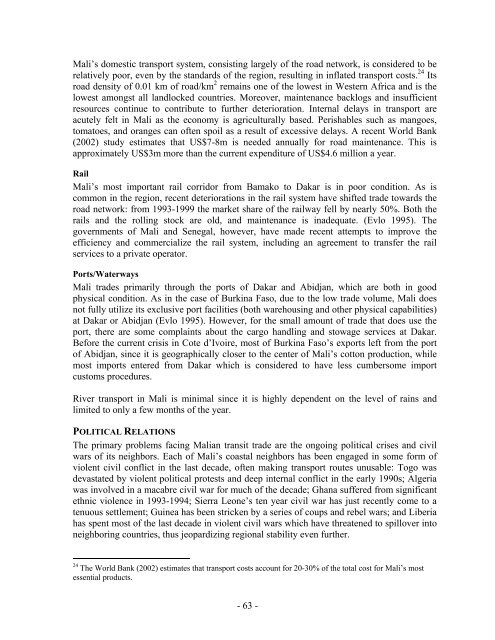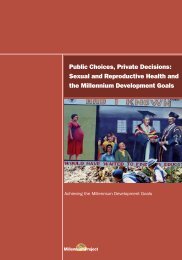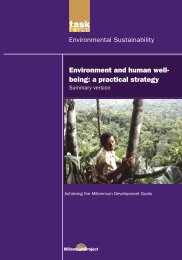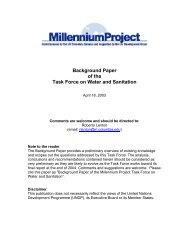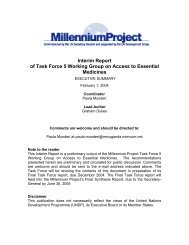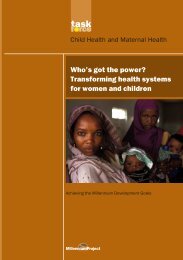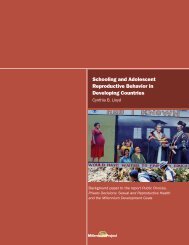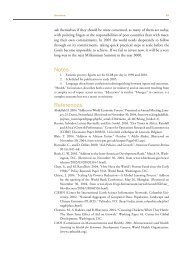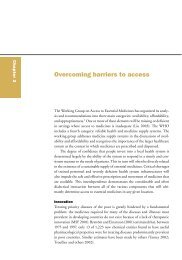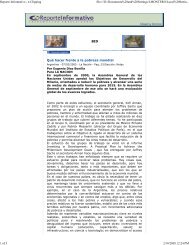the challenges facing landlocked developing countries: a case study ...
the challenges facing landlocked developing countries: a case study ...
the challenges facing landlocked developing countries: a case study ...
Create successful ePaper yourself
Turn your PDF publications into a flip-book with our unique Google optimized e-Paper software.
Mali’s domestic transport system, consisting largely of <strong>the</strong> road network, is considered to be<br />
relatively poor, even by <strong>the</strong> standards of <strong>the</strong> region, resulting in inflated transport costs. 24 Its<br />
road density of 0.01 km of road/km 2 remains one of <strong>the</strong> lowest in Western Africa and is <strong>the</strong><br />
lowest amongst all <strong>landlocked</strong> <strong>countries</strong>. Moreover, maintenance backlogs and insufficient<br />
resources continue to contribute to fur<strong>the</strong>r deterioration. Internal delays in transport are<br />
acutely felt in Mali as <strong>the</strong> economy is agriculturally based. Perishables such as mangoes,<br />
tomatoes, and oranges can often spoil as a result of excessive delays. A recent World Bank<br />
(2002) <strong>study</strong> estimates that US$7-8m is needed annually for road maintenance. This is<br />
approximately US$3m more than <strong>the</strong> current expenditure of US$4.6 million a year.<br />
Rail<br />
Mali’s most important rail corridor from Bamako to Dakar is in poor condition. As is<br />
common in <strong>the</strong> region, recent deteriorations in <strong>the</strong> rail system have shifted trade towards <strong>the</strong><br />
road network: from 1993-1999 <strong>the</strong> market share of <strong>the</strong> railway fell by nearly 50%. Both <strong>the</strong><br />
rails and <strong>the</strong> rolling stock are old, and maintenance is inadequate. (Evlo 1995). The<br />
governments of Mali and Senegal, however, have made recent attempts to improve <strong>the</strong><br />
efficiency and commercialize <strong>the</strong> rail system, including an agreement to transfer <strong>the</strong> rail<br />
services to a private operator.<br />
Ports/Waterways<br />
Mali trades primarily through <strong>the</strong> ports of Dakar and Abidjan, which are both in good<br />
physical condition. As in <strong>the</strong> <strong>case</strong> of Burkina Faso, due to <strong>the</strong> low trade volume, Mali does<br />
not fully utilize its exclusive port facilities (both warehousing and o<strong>the</strong>r physical capabilities)<br />
at Dakar or Abidjan (Evlo 1995). However, for <strong>the</strong> small amount of trade that does use <strong>the</strong><br />
port, <strong>the</strong>re are some complaints about <strong>the</strong> cargo handling and stowage services at Dakar.<br />
Before <strong>the</strong> current crisis in Cote d’Ivoire, most of Burkina Faso’s exports left from <strong>the</strong> port<br />
of Abidjan, since it is geographically closer to <strong>the</strong> center of Mali’s cotton production, while<br />
most imports entered from Dakar which is considered to have less cumbersome import<br />
customs procedures.<br />
River transport in Mali is minimal since it is highly dependent on <strong>the</strong> level of rains and<br />
limited to only a few months of <strong>the</strong> year.<br />
POLITICAL RELATIONS<br />
The primary problems <strong>facing</strong> Malian transit trade are <strong>the</strong> ongoing political crises and civil<br />
wars of its neighbors. Each of Mali’s coastal neighbors has been engaged in some form of<br />
violent civil conflict in <strong>the</strong> last decade, often making transport routes unusable: Togo was<br />
devastated by violent political protests and deep internal conflict in <strong>the</strong> early 1990s; Algeria<br />
was involved in a macabre civil war for much of <strong>the</strong> decade; Ghana suffered from significant<br />
ethnic violence in 1993-1994; Sierra Leone’s ten year civil war has just recently come to a<br />
tenuous settlement; Guinea has been stricken by a series of coups and rebel wars; and Liberia<br />
has spent most of <strong>the</strong> last decade in violent civil wars which have threatened to spillover into<br />
neighboring <strong>countries</strong>, thus jeopardizing regional stability even fur<strong>the</strong>r.<br />
24 The World Bank (2002) estimates that transport costs account for 20-30% of <strong>the</strong> total cost for Mali’s most<br />
essential products.<br />
- 63 -


